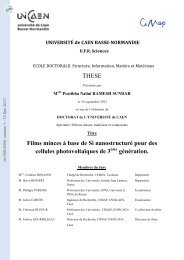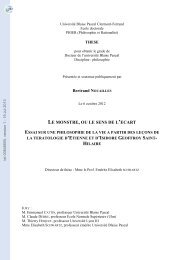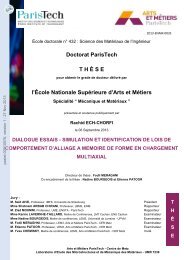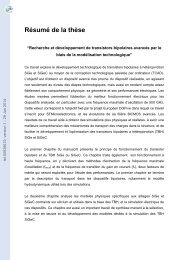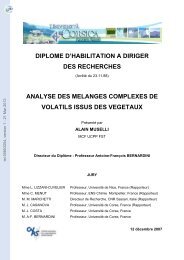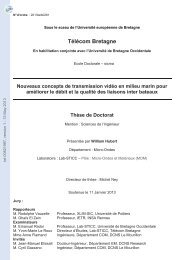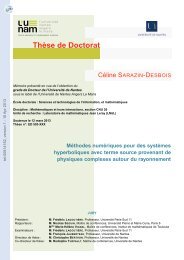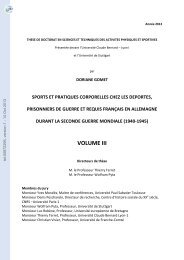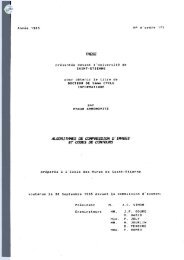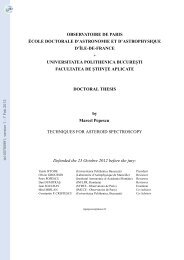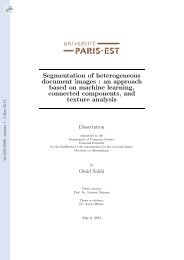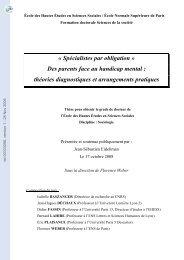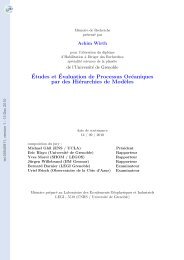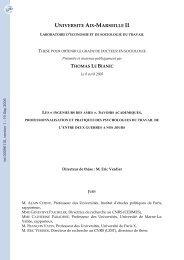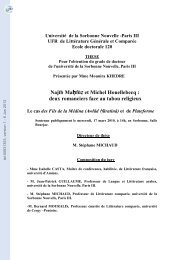Etude de la combustion de gaz de synthèse issus d'un processus de ...
Etude de la combustion de gaz de synthèse issus d'un processus de ...
Etude de la combustion de gaz de synthèse issus d'un processus de ...
You also want an ePaper? Increase the reach of your titles
YUMPU automatically turns print PDFs into web optimized ePapers that Google loves.
Chapter 5<br />
observation emphasis the fact of the lower peak pressures for ignition timings close to<br />
TDC. As seen on 3.2.5 turbulence intensity is higher close to TDC on the RCM, thus<br />
the increased turbulence in the unburned mixture at the time of <strong>combustion</strong> will<br />
increase the burning rate (Al<strong>la</strong>, 2002).<br />
Comparing the three fuels, it is observed that <strong>combustion</strong> is faster for methane,<br />
followed by downdraft syngas and finally by updraft syngas. This behavior is in<br />
agreement with the heat of reaction of the mixtures as well as with the <strong>la</strong>minar burning<br />
velocity <strong>de</strong>termined on 4.1.2.3 for typical syngas compositions.<br />
5.3 Conclusion<br />
tel-00623090, version 1 - 13 Sep 2011<br />
An experimental approach to syngas engine-like conditions on a rapid compression<br />
machine is ma<strong>de</strong>.<br />
There is an opposite behavior of the in-cylin<strong>de</strong>r pressure between single compression<br />
and compression-expansion strokes. The first is that one gets higher in-cylin<strong>de</strong>r<br />
pressures on single compression event than for compression-expansion events, which<br />
emphasis the fact of the constant volume <strong>combustion</strong> to be the way of getting higher<br />
pressures. The second is that for single compression peak pressure <strong>de</strong>creases as the<br />
ignition <strong>de</strong><strong>la</strong>y increases. In opposite, for compression-expansion the peak pressure<br />
increases with the ignition <strong>de</strong><strong>la</strong>y increase. This opposite behaviour in re<strong>la</strong>tion to the<br />
ignition timing has to do with the <strong>de</strong>viation of the spark from TDC position that<br />
influences the extent of the <strong>combustion</strong> in the compression stroke and this extent has<br />
different consequences on peak pressure regarding to the number of strokes events.<br />
For single compression it reduces the constant volume <strong>combustion</strong> duration. For<br />
compression-expansion strokes it increases the <strong>combustion</strong> duration on the<br />
compression stroke where the heat released has the effect of generate pressure before<br />
expansion.<br />
In both experimental events, higher pressures are obtained with methane-air mixture<br />
followed by downdraft-syngas and <strong>la</strong>stly by updraft-syngas. These results could be<br />
endorsed to the heat of reaction of the fuels and air to fuel ratio un<strong>de</strong>r stoichiometric<br />
conditions, but also to burning velocity. Crossing the heat value with the air to fuel ratio<br />
conclusion could be drawn that the energy content insi<strong>de</strong> the <strong>combustion</strong> chamber is in<br />
agreement, however not proportional with the obtained pressures.<br />
165



